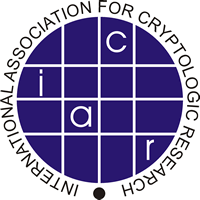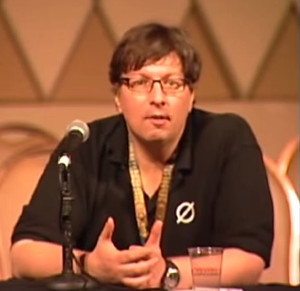Related Research Articles
Pretty Good Privacy (PGP) is an encryption program that provides cryptographic privacy and authentication for data communication. PGP is used for signing, encrypting, and decrypting texts, e-mails, files, directories, and whole disk partitions and to increase the security of e-mail communications. Phil Zimmermann developed PGP in 1991.
A cypherpunk is any individual advocating widespread use of strong cryptography and privacy-enhancing technologies as a route to social and political change. Originally communicating through the Cypherpunks electronic mailing list, informal groups aimed to achieve privacy and security through proactive use of cryptography. Cypherpunks have been engaged in an active movement since at least the late 1980s.

Communications security is the discipline of preventing unauthorized interceptors from accessing telecommunications in an intelligible form, while still delivering content to the intended recipients.

John Gilmore is one of the founders of the Electronic Frontier Foundation, the Cypherpunks mailing list, and Cygnus Solutions. He created the alt.* hierarchy in Usenet and is a major contributor to the GNU Project.

The International Association for Cryptologic Research (IACR) is a non-profit scientific organization that furthers research in cryptology and related fields. The IACR was organized at the initiative of David Chaum at the CRYPTO '82 conference.
Articles related to cryptography include:

The Clipper chip was a chipset that was developed and promoted by the United States National Security Agency (NSA) as an encryption device that secured "voice and data messages" with a built-in backdoor that was intended to "allow Federal, State, and local law enforcement officials the ability to decode intercepted voice and data transmissions." It was intended to be adopted by telecommunications companies for voice transmission. Introduced in 1993, it was entirely defunct by 1996.

Export of cryptographic technology and devices from the United States was severely restricted by U.S. law until 1992. The law gradually became eased until around 2000, but some restrictions still remain today.
End-to-end encryption (E2EE) is a system of communication where only the communicating users can read the messages. In principle, it prevents potential eavesdroppers – including telecom providers, Internet providers, malicious actors, and even the provider of the communication service – from being able to access the cryptographic keys needed to decrypt the conversation.

Matt Blaze is an American researcher who focuses on the areas of secure systems, cryptography, and trust management. He is currently the McDevitt Chair of Computer Science and Law at Georgetown University, and is on the board of directors of the Tor Project.

CrypTool is an open-source project that is a free e-learning software for illustrating cryptographic and cryptanalytic concepts. According to "Hakin9", CrypTool is worldwide the most widespread e-learning software in the field of cryptology.

Network Security Services (NSS) is a collection of cryptographic computer libraries designed to support cross-platform development of security-enabled client and server applications with optional support for hardware TLS/SSL acceleration on the server side and hardware smart cards on the client side. NSS provides a complete open-source implementation of cryptographic libraries supporting Transport Layer Security (TLS) / Secure Sockets Layer (SSL) and S/MIME. NSS releases prior to version 3.14 are tri-licensed under the Mozilla Public License 1.1, the GNU General Public License, and the GNU Lesser General Public License. Since release 3.14, NSS releases are licensed under GPL-compatible Mozilla Public License 2.0.
In cryptography, Curve25519 is an elliptic curve offering 128 bits of security and designed for use with the elliptic curve Diffie–Hellman (ECDH) key agreement scheme. It is one of the fastest ECC curves and is not covered by any known patents. The reference implementation is public domain software.
There are various implementations of the Advanced Encryption Standard, also known as Rijndael.

Moxie Marlinspike is an American entrepreneur, cryptographer, and computer security researcher. Marlinspike is the creator of Signal, co-founder of the Signal Technology Foundation, and served as the first CEO of Signal Messenger LLC. He is also a co-author of the Signal Protocol encryption used by Signal, WhatsApp, Google Messages, Facebook Messenger, and Skype.

Cryptocat is a discontinued open-source desktop application intended to allow encrypted online chatting available for Windows, OS X, and Linux. It uses end-to-end encryption to secure all communications to other Cryptocat users. Users are given the option of independently verifying their buddies' device lists and are notified when a buddy's device list is modified and all updates are verified through the built-in update downloader.
Wickr is an American software company based in New York City. The company is best known for its instant messenger application of the same name. The Wickr instant messaging apps allow users to exchange end-to-end encrypted and content-expiring messages, including photos, videos, and file attachments. The software is available for the iOS, Android, Mac, Windows, and Linux operating systems. On June 25, 2021, Wickr was acquired by Amazon Web Services.

The Crypto Wars is an unofficial name for the attempts of the United States (US) and allied governments to limit the public's and foreign nations' access to cryptography strong enough to thwart decryption by national intelligence agencies, especially the National Security Agency (NSA).

Human rights applied to encryption is a concept of freedom of expression where encryption is a technical resource in the implementation of basic human rights.
CryptoHarlem is a nonprofit, anti-surveillance, cybersecurity education and advocacy organization. Founded by Matt Mitchell in 2013, CryptoHarlem provides the predominantly African American community in upper Manhattan with free workshops on digital security, encryption, privacy, cryptography, digital policing and surveillance.
References
- ↑ "Encryption Backers Brace for New Threats". Associated Press. March 31, 2003.
- ↑ Open Protocol Enabling New Universal Dividend Currencies: Open-UDC/open-udc, OpenUDC, 2019-08-13, retrieved 2019-10-16
- ↑ Fred Espenak. "Eclipses During 1998". eclipse.gsfc.nasa.gov. NASA. Retrieved 27 January 2018.
- ↑ Kettmann, Steve (August 13, 2001). "Hackers: Wake Up and Be Useful". Wired. Retrieved December 31, 2012.
- ↑ "Dave Del Torto". cyberlaw.stanford.edu. Retrieved 2021-11-16.
- ↑ Stark, Thom (December 1, 2000). "They Might Be Giants". Boardwatch Magazine. pp. n.12, v.14, p.122.
- ↑ Will Rodger, "Safe Haven", Interactive Week, v.8, no. 28, p.30 (July 16, 2001).